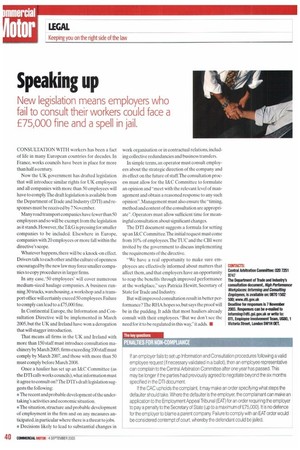Speaking up
Page 40

If you've noticed an error in this article please click here to report it so we can fix it.
New legislation means employers who fail to consult their workers could face a £75,000 fine and a spell in jail.
CONSULTATION WITH workers has been a fact of life in many European countries for decades. In France, works councils have been in place for more than half a century.
Now the UK government has drafted legislation that will introduce similar rights for UK employees and all companies with more than 50 employees will have to comply. The draft legislation is available from the Department of Trade and Industry (DTI) and responses must be received by 7 November.
Many road transport companies have fewer than 50 employees and so will be exempt from the legislation as it stands. However, the T&G is pressing for smaller companies to be included. Elsewhere in Europe, companies with 20 employees or more fall within the directive's scope.
Whatever happens, there will be a knock-on effect. Drivers talk to each other and the culture of openness encouraged by the new law may force smaller companies to copy procedures in larger firms.
In any case, '50 employees' will cover numerous medium-sized haulage companies. A business running 30 trucks, warehousing, a workshop and a transport office will certainly exceed 50 employees. Failure to comply can lead to a £75,000 fine.
In Continental Europe, the Information and Consultation Directive will be implemented in March 2005, but the UK and Ireland have won a derogation that will stagger introduction.
That means all firms in the UK and Ireland with more than 150 staff must introduce consultation machinery by March 2005; firms exceeding 100 staff must comply by March 2007, and those with more than 50 must comply before March 2005.
Once a haulier has set up an I&C Committee (as the DTI calls works councils), what information must it agree to consult on?The DTI's draft legislation suggests the following: • The recent and probable development of the undertaking's activities and economic situation.
• The situation, structure and probable development of employment in the firm and on any measures anticipated, in particular where there is a threat to jobs.
• Decisions likely to lead to substantial changes in work organisation or in contractual relations, including collective redundancies and business transfers.
In simple terms, an operator must consult employees about the strategic direction of the company and its effect on the future of staff. The consultation process must allow for the I&C Committee to formulate an opinion and "meet with the relevant level of management and obtain a reasoned response to any such opinion". Management must also ensure the "timing, method and content of the consultation are appropriate". Operators must allow sufficient time for meaningful consultation about significant changes.
The DTI document suggests a formula for setting up an I&C Committee.The initial request must come from 10% of employees. The TUC and the CBI were invited by the government to discuss implementing the requirements of the directive.
"We have a real opportunity to make sure employees are effectively informed about matters that affect them, and that employers have an opportunity to reap the benefits through improved performance at the workplace," says Patricia Hewitt, Secretary of State for Trade and Industry.
But will improved consultation result in better performance? The RI-IA hopes so, but says the proof will be in the pudding. It adds that most hauliers already consult with their employees. "But we don't see the need for it to be regulated in this way," it adds. •
















































































































































































































